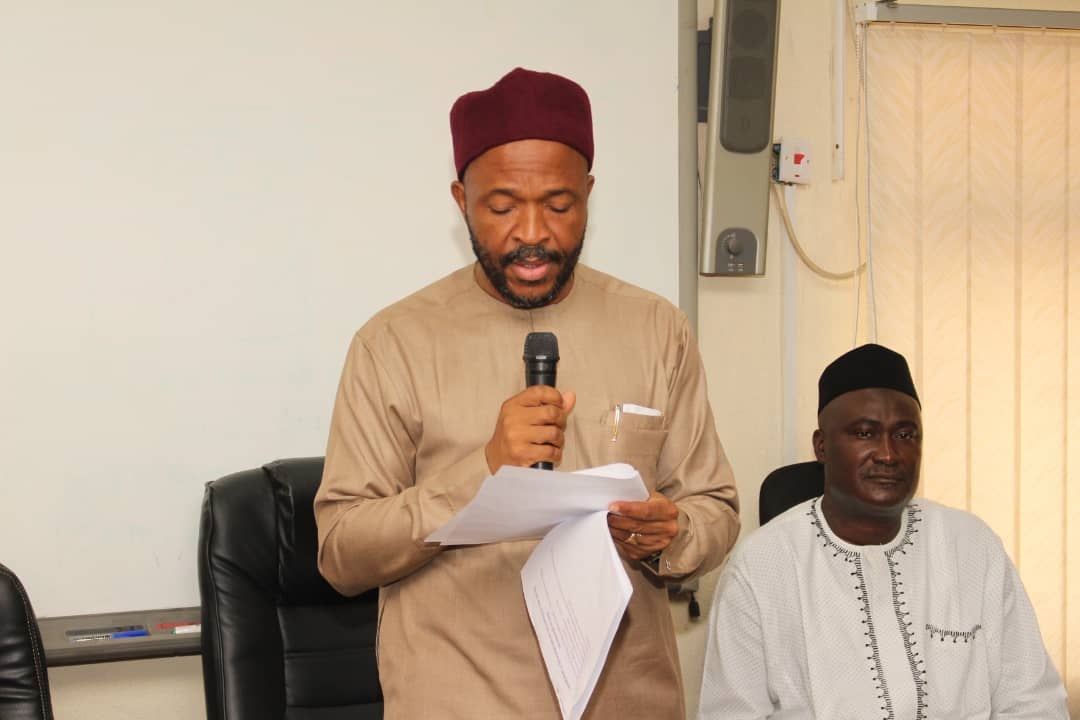Education
ASUU: Ex-minister faults state varsities, protests rock South-West, Edo

The immediate past Minister of State for Education, Chukwuemeka Nwajiuba, has faulted lecturers of state universities who are participating in the going strike by the Academic Staff Union of Universities.
While saying state universities have no business in the ongoing strike, Nwajiuba, who resigned last week due to his presidential ambition, explained that most ASUU’s demands centre on challenges being faced by federal universities.
He spoke in an interview with The PUNCH on Monday just as university students in the South West protested against the ongoing strike in Ogun, Osun, Ondo and Edo States.
The PUNCH had reported that ASUU, on February 14, 2022 announced the commencement of a nationwide strike which involved all its chapters across the country, including those in state universities.
While Kaduna State University had announced that it was opting out of the strike, some other state universities such as Ambrose Ali University, Ekpoma; Ladoke Akintola University of Technology, Ogbomosho; and Olabisi Onabanjo University, Ago Iwoye, among others insisted that they would not call off the strike.
Nwajiuba, however, encouraged ASUU members to shelve the strike.
He said, “State universities have no business with the ASUU strike. The demands that were laid down contained issues relating to federal universities and their employer, which is the Federal Government.
“For instance, ASUU talked about the introduction of University Transparency and Accountability Solution for the payment of salaries of federal lecturers. Why are state universities engaged in a struggle between the Federal Government and lecturers of federal universities? It is the state government that pays state universities, so why the need for the strike?
“We are optimistic that the strike will be called off soon. They agreed to meet with the government and that is a good step. I have always been a firm believer that you do not have to go on strike before your demands are met.”
Students of different universities in Ondo State on Monday staged a protest to register their displeasure over the prolonged strike.
The protesting students blocked the Ilesha-Akure Expressway in Akure, chanting different solidarity songs.
They wielded placards with different inscriptions such as ‘ End ASUU strike,’ ‘Save our future,’ and FG, we’ve had enough,’ among others.
The protesters included students of Adekunle Ajasin University, Akungba Akoko; Olusegun Agagu University of Technology, Okitipupa; and the Federal University of Technology, Akure.
The protest caused traffic gridlock on the highway with many travellers and motorists stranded while some motorists had to take alternative routes to their destinations.
Speaking on the protest, the Vice Chairman, National Association of University Students, Ondo Chapter, Shittu Afolarin, stated that the move became imperative after it was discovered that the Federal Government is not concerned about the plight of students.
In Osun State, protest by some students of Obafemi Awolowo University, Ile-Ife organised by Great Ife Concerned Students in collaboration with Fund Education Coalition against strike, resumed on Monday as the protesters blocked some major roads in the state too.
The protesters had initially blocked Ife-Ede Road, and later moved to Ipetumodu and blocked Ife-Ibadan, Ilesa-Akure road in front of Oduduwa University, thereby preventing vehicular movement.
Speaking with The PUNCH, the leader of the protesters, Omowumi Abraham, popularly known as Ewatee, said a vehicle conveying two soldiers heading towards Gbongan-Ibadan end from Ipetumodu, had forced it way through their barricade.
She said two other vehicles also conveying soldiers heading towards same direction were however prevented from going through and were forced to make a detour.
Students in Ogun State also on Monday blocked the Sagamu-Benin Expressway in protest against the ongoing strike.
The joint protest had in attendance students from OOU, Ago-Iwoye; Tai Solarin University of Education, Science and Technology, Ijagun and Federal University of Agriculture, Abeokuta.
The News Agency of Nigeria reported that the students stormed the TASUED axis and blocked the expressway, leaving many motorists stranded and travellers trapped.
Speaking at the protest ground, the Chairman, National Association of Nigerian Students in the state, Damilola Simeon, appealed to the Federal Government to respond urgently to the yearnings of ASUU.
The President, Student Union Government of TASUED, Don Ayomide, also said the protest was necessary to let both the Federal Government and ASUU be aware of the plight of Nigerian students.
Reacting to the students’ protest, ASUU Chairman, FUNAAB, , Dr Gbenga Adeleye, told NAN that the students had a right to quality education, saying that they were not happy with the ongoing strike.
In Edo State, students of the University of Benin on Monday shut down the Federal Secretariat in Benin in continuation of their protest over the strike.
The students stormed the Aduwawa area where the office is situated and told the workers that they could take the day off as it was impossible for them to carry out their duties, while students continue to suffer over the strike.
The students said they have resolved to shut Federal Government offices in the state to press home their demand for the resolution of the crisis
President of the UNIBEN Student Union Government, Foster Amadin, said the government has not shown seriousness over the resolution, wondering for how long the students would stay at home doing nothing.
Education
UTME: JAMB Clarifies Position on Hijab During Biometric Capture

UTME: JAMB Clarifies Position on Hijab During Biometric Capture
The Joint Admissions and Matriculation Board (JAMB) has clarified that candidates are not required to remove their hijab during the Unified Tertiary Matriculation Examination (UTME) registration process.
The examination body issued the clarification following the circulation of a viral video alleging that a Muslim candidate was compelled to remove her hijab before capturing her biometric photograph at a registration centre.
In a statement addressing the controversy, JAMB dismissed claims of a policy prohibiting the use of hijab, describing such reports as misleading. The board reiterated that it respects candidates’ religious rights and does not mandate the removal of religious head coverings during registration.
However, JAMB explained that during biometric data capture, candidates may be asked to adjust their head coverings slightly to ensure that key facial features are visible for proper identification. According to the board, this requirement is strictly for technical purposes and aligns with standard identification procedures used in official documentation processes.
The board emphasized that the adjustment does not equate to a ban on hijabs, noting that clear visibility of facial features is necessary to meet biometric verification standards and prevent identity-related issues.
JAMB urged the public to disregard misinformation and advised candidates and parents to seek clarification through official communication channels to avoid unnecessary panic.
The clarification comes amid growing public interest in ensuring that examination procedures remain inclusive while maintaining the integrity of the registration and identification process.
UTME: JAMB Clarifies Position on Hijab During Biometric Capture
Education
Ogun Gov Rewards Nigeria’s Best Primary School Teacher with Car, Bungalow

Ogun Gov Rewards Nigeria’s Best Primary School Teacher with Car, Bungalow

Ogun Gov Rewards Nigeria’s Best Primary School Teacher Solanke Francis Taiwo with Car and Bungalow
The Ogun State Governor, Dapo Abiodun, has honoured Mr Solanke Francis Taiwo, a primary school teacher at Ansa‑Ur‑Deen Main School I, Kemta Lawa, Abeokuta, with a brand new car and a two‑bedroom bungalow in recognition of his achievement as Nigeria’s Overall Best Primary School Teacher for the 2025/2026 academic year.
The presentation took place at the Governor’s Office in Oke‑Mosan, Abeokuta, with the Commissioner for Education, Science and Technology, Prof Abayomi Arigbagbu, and the ministry’s Permanent Secretary, Mr Oloko, in attendance. The gifts were part of a broader effort to motivate teachers, reward professional excellence, and highlight the state’s education reforms.
Speaking at the event, Prof Arigbagbu said the award demonstrates the effectiveness of the Ogun State Education Revitalisation Agenda, which is built on six pillars including curriculum enhancement, school administration, innovation, infrastructure, funding, and teachers’ welfare. “When you do things consistently and efficiently, you record results. This same teacher won the Ogun State Best Teacher Award in October before clinching the national award in Abuja. This confirms that our education sector has been truly revitalised,” he said.
READ ALSO:
- Police Bust Gang Armoury, Arrest Two Suspects in Delta
- Peter Obi Launches ‘Village Boys Movement’ to Rival Tinubu’s City Boys Ahead of 2027
- Woman Dies in Bandits’ Camp After Family Pays ₦25 Million Ransom

Ogun Gov Rewards Nigeria’s Best Primary School Teacher Solanke Francis Taiwo with Car and Bungalow
He highlighted the state’s successes in national competitions, including the JETS contests, where Ogun students won 18 out of 24 awards in one year, with a single student claiming nine prizes. The commissioner also noted that Ogun’s Technical and Vocational Education and Training (TVET) model and education digitisation initiatives have attracted attention from other states and received commendation from the Federal Government and the National Board for Technical Education.
Governor Abiodun reaffirmed his commitment to teacher development, pledging continuous support through workshops, seminars, digital learning platforms, and AI-powered instructional tools. He said the gifts of a car and bungalow are intended to inspire other educators to strive for excellence and innovation in their teaching.
In his remarks, Mr Solanke expressed gratitude to the governor and the education ministry for fostering an enabling environment for teaching and learning. He vowed to continue improving student learning outcomes and collaborating with colleagues to ensure that Ogun State remains a leader in education excellence.
“I feel fulfilled and honoured. I will continue to give my best and encourage fellow teachers to remain dedicated to nurturing the potential of every student,” he said.
The recognition of Mr Solanke reflects Ogun State’s strategic investment in education, commitment to teacher welfare, and the effectiveness of policies that have positioned the state as a model for academic excellence in Nigeria.
Ogun Gov Rewards Nigeria’s Best Primary School Teacher with Car, Bungalow
Education
Over 1.5 Million Candidates Registered as JAMB UTME Pin Vending Nears Deadline

Over 1.5 Million Candidates Registered as JAMB UTME Pin Vending Nears Deadline
The Joint Admissions and Matriculation Board (JAMB) has confirmed that more than 1.5 million candidates have registered for the 2026 Unified Tertiary Matriculation Examination (UTME), as the deadline for e‑PIN vending and registration rapidly approaches.
In a statement released in Abuja by the board’s Public Communication Advisor, Dr. Fabian Benjamin, the board said the sale of e‑PINs — required for candidates to proceed with registration at accredited centers — will close at midnight on Thursday, February 26, 2026, while actual registration at centres will end on Saturday, February 28, 2026.
According to JAMB, its daily registration capacity stands at 100,000 candidates, but most centres are currently operating at roughly 30 per cent capacity, indicating that a significant number of eligible candidates have yet to register. The board emphasised that there will be no extension of the registration window, explaining that the schedule aligns with the national examination calendar and is coordinated to allow other examination bodies to conduct their exercises without conflict.
READ ALSO:
- FG Seals Plateau Mine After 37 Killed in Toxic Gas Tragedy
- Troops Kill Five Kidnappers, Rescue Abducted Woman in Plateau
- Sowore Condemns Electoral Act 2026 as Threat to Nigeria’s Democracy
JAMB urged candidates to secure their e‑PINs early and complete registration at accredited CBT centres without delay. The board warned that last-minute registration could result in avoidable challenges and reiterated that it will not entertain appeals for deadline extensions.
The 2026 UTME is scheduled to hold from April 16 to April 25 and will determine admission into universities, polytechnics, and colleges of education across Nigeria. JAMB also assured candidates that all testing centres would have adequate security, technical support, and invigilation to ensure a smooth and credible examination process.
Education experts and stakeholders have encouraged candidates to register promptly and take advantage of preparatory resources offered online and at local centres. State education authorities have also organised orientation programmes to guide students through registration, examination, and post-UTME procedures.
JAMB continues to provide updates and guidance through its official portal and social media channels, ensuring that candidates have access to information about registration, examination procedures, and exam day requirements.
Over 1.5 Million Candidates Registered as JAMB UTME Pin Vending Nears Deadline
-

 Politics2 days ago
Politics2 days agoPeter Obi Launches ‘Village Boys Movement’ to Rival Tinubu’s City Boys Ahead of 2027
-

 International3 days ago
International3 days agoCanada Opens New Express Entry Draw for Nigerian Workers, Others
-

 News2 days ago
News2 days agoPolice to Arrest TikToker Mirabel After She Recants False Rape Claim
-

 International2 days ago
International2 days agoEpstein, Ex-Israeli PM Named in Alleged Profiteering From Boko Haram Crisis
-

 metro3 days ago
metro3 days agoOsun Awards 55.6km Iwo–Osogbo–Ibadan Road Project to Three Contractors
-

 Education10 hours ago
Education10 hours agoUTME: JAMB Clarifies Position on Hijab During Biometric Capture
-

 Politics3 days ago
Politics3 days agoUpdated: Rivers Senator Mpigi Barinada dies at 64
-

 metro3 days ago
metro3 days agoOndo Monarch Killed as Bandits Strike Akure North















